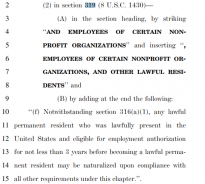Dear all, I think you heard that democrats have finally revealed their new immigration bill (The full bill is here: https://assets.documentcloud.org/documents/20488022/uscitizenshipact2021billtext.pdf ). One section of the bill caught my attention, and it sounded too good to b true! Here it is below, please give me your opinion, and if you have heard lawyers' opinion on it please share it with us:
" ‘(f) Notwithstanding section 316(a)(1), any lawful permanent resident who was lawfully present in the United States and eligible for employment authorization for not less than 3 years before becoming a lawful permanent resident may be naturalized upon compliance with all other requirements under this chapter.’’.
I don't think asylum applicant with 3 years of employment based on his asylum case pending is gonna fit under this category as lawfully present in the United States. Usually lawfully present refers to any kind of status and asylum applicant doesn't have any.
This is gonna work for people with work visas like H-1B / O-1 / L-1 etc. So you worked 3 years on visa then became LPR and can naturalize immediately if you have your 3 years of lawful presence with employment authorization before becoming a LPR.

